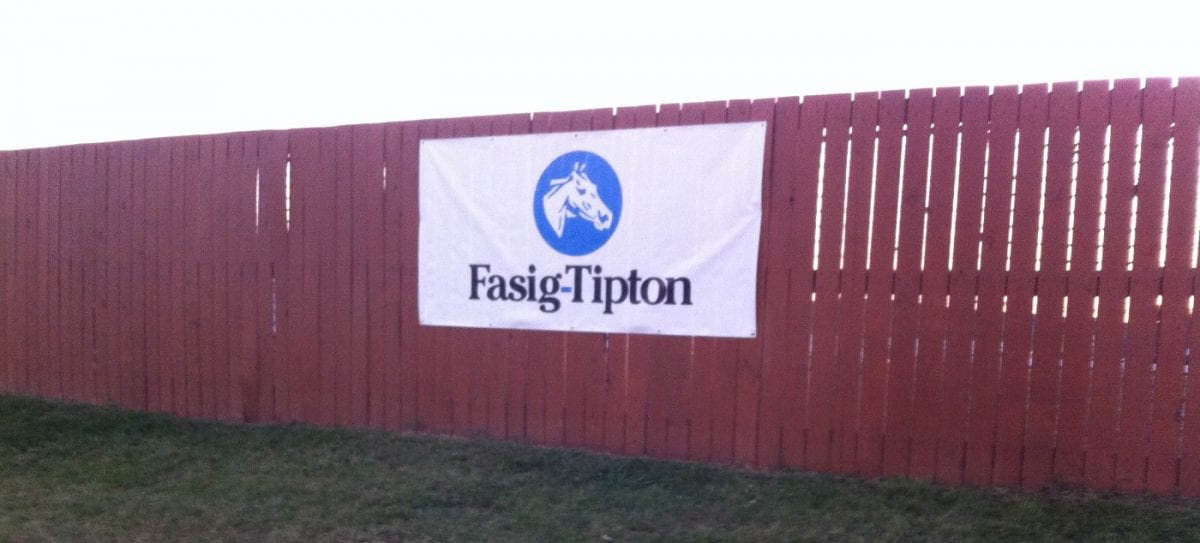[/boxify]
by Frank Vespe
“That’s called a Maryland-bred,” crowed David Hayden late Monday afternoon at the Fasig-Tipton sale.
Hayden, the owner with his wife JoAnn of Dark Hollow Farm, had reason to exult. He had just sold Hip 325, a Maryland-bred, bay colt by Tiz Wonderful, for $175,000. The colt, out of the winning Dixie Union mare Memories of Mystic and a half-brother to stakes winner Mystic Love, was the sale’s second highest seller and the highest seller of any horse bred in the mid-Atlantic region.
And in the first regional sale to take place following the implementation of the newly enhanced program to support Maryland-breds (here), those facts mattered.
Indeed, evidence that the word was out on the state’s enhanced bred program was all around on Monday. Fasig-Tipton opened the auction with an announcement about the program, encouraging buyers to check out the Maryland-breds on offer.
The number of Maryland-breds sold increased from 65 to 71; conversely, the number of horses bred in Pennsylvania, the leading mid-Atlantic breeding state, declined from 90 to 82.
The value of those Maryland-bred horses rose, too, with two of them crossing the $100,000 threshold, a feat that no Maryland-bred accomplished last year at this sale. The gross value of Maryland-breds sold was up nearly 12 percent, and the average of the top 10 sellers was up even more than that, from $65,900 to $74,000.
What’s more, among new sires, the two with the largest number of offspring in the sale — Street Magician with 11 and Bullsbay with seven — both stand in Maryland, at Northview Stallion Station.
“It’s nice to see these young Turks coming online,” Mike Pons of Country Life Farm told me. “I’m getting phone calls I haven’t gotten in 10 years.” Of course, he has more than a rooting interest in a strong market for Maryland-breds; he and his brother Josh are banking heavily on a trio of relatively new stallions — Cal Nation, Friesan Fire, and Freedom Child, who was the subject of a stallion show in Timonium on Sunday.
From the buyer side, the feeling was similar. Trainer Donald Barr, who bought a couple of horses for a client, described the sale as “buyable.” He noted, “The better horses should bring money — they do,” adding that he thought the market for Maryland-breds was “really good.”
And trainer Phil Schoenthal, who converted a win in the Grade 2 Matron on Sunday, with Miss Behaviour, into four new horses on Monday, said that the sale “feels strong,” though not quite as vigorous as the Keeneland sale had been. “We couldn’t even get our hands in the air” before bidding had passed their limits at Keeneland, he said.
Meanwhile, for those seeking bargains, the going was tougher. “There’s no bargains here,” one horseman grumbled to me. And trainer Ferris Allen, who added one horse at the sale, explained, “There’s money at the top for a good horse, but the middle of the market is a tough place to be.”
For all that, it’s still clear that the Maryland-bred recovery remains a young and fragile thing. The average sale price of Maryland-breds was essentially flat, rising just about two percent to about $23,500. What’s more, while the buyback rate for the sale as a whole fell to less than 14 percent on Monday, for Maryland-breds it rose, though it remains slightly below the rate for the sale as a whole.
Maryland’s racing and breeding industries are just now beginning to find solid footing after years in which nearby competitors used slot machine-generated moneys to vault ahead of the state. With slots finally online in Maryland, and projected to add substantially to purses and to the bred fund in the coming years, the state has an opportunity to regain what many Marylanders regard as the state’s rightful place in the regional racing hierarchy. To do that will take time, and collaborative effort.
Still, even before he’d sold Hip 325, David Hayden, who’d advocated for changes in the state’s breeding program, sensed that times were changing. An hour or so before the star of his consignment took the stage, he’d observed, “There’s a whole lot more energy here than last year.”







